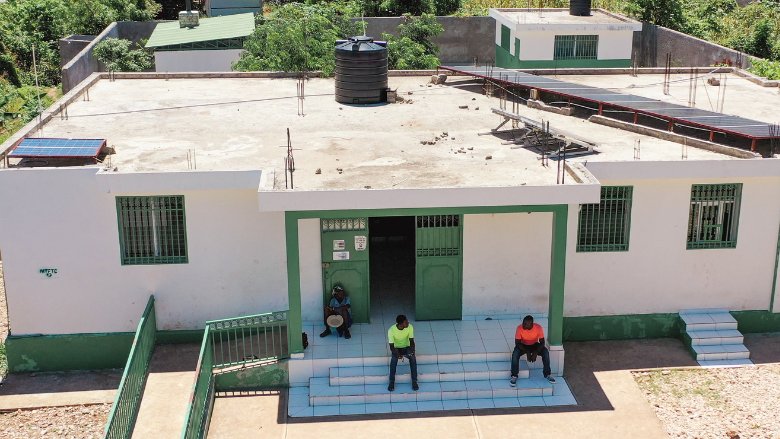Every Tuesday is a public market day in Mouline, a community in Haiti’s Beaumont commune of the Grand’Anse department that was severely affected by Hurricane Mathew in 2016 and a tremendous earthquake five years later. For 23-year-old Roseline Jozil, market day is a chance to take advantage of the lack of crowds at the community clinic for a postnatal consultation with her three-month-old baby.
This is new for Roseline. The clinic was severely affected by the hurricane and the earthquake, and so the 4,000 residents of Mouline and neighboring communities had to walk for a few hours to access good basic health care in a safe environment. The Mouline health center has since been reopened and expanded. It now has four rooms with a triage center, a delivery room, an emergency area, and a pharmacy.
“I come here regularly for consultations. During my pregnancy, I benefited from four free prenatal visits, which were very useful to help me understand the evolution of the baby and to learn about baby care,” Roseline said while looking enthusiastically around the new facilities and at her baby daughter. “Today I’m here to make a postnatal follow-up with my newborn and give her a vaccine.”
Since the rehabilitation, health-care providers at the Mouline Center have seen an average of 20 patients per day. They offer preventive, emergency, inpatient, and outpatient care, as well as diagnostic laboratory services. The center is equipped with a renewable energy system so that cold products can be adequately stored. It also offers vaccination services for babies and infants from birth to 60 months.
Providing health care to improve human capital
Haiti continues to be marred by a lingering political and institutional crisis, which are compounded by extreme gang violence. This has affected the health sector’s ability to provide services, specifically in more remote areas like Mouline. This is expected to decrease the economic and professional potential of Haitians. According to the World Bank’s Human Capital Index for 2020, a child born today in Haiti will grow up to be only 45 percent as productive as they could have been if they had enjoyed full access to quality education and health care.
Haiti has had mixed progress in improving the access to and quality of its health services, hampering the improvement in health outcomes. Maternal and neonatal mortality remain high. The rates have not improved in the past decade, a sign of the continued gaps in maternal and children health care. Across Haiti, 94 out of 100 children will survive to the age of 5, but only 78 percent of 15-year-olds will survive until the age of 60, a sign of the high burden of communicable and noncommunicable diseases, as well as the continued gaps in maternal and child health care.
While the overall use of health services has improved over the past few years, the low percentage of children fully vaccinated decreased from around 40 percent in 2017 to 30 percent in mid-2021. But the proportion of births assisted by skilled personnel increased from 37 percent in 2012 to 42 percent in 2016-2017. Skilled birth attendance has increased in rural areas, but declined in urban areas because of the barriers to access to both health services and finance. Limited health services are provided in public clinics and hospitals, with nongovernmental and private clinics playing an important role in this provision.
Haiti’s government spending on human development is the lowest in Latin America and the Caribbean, and this lack of support contributes to low levels of human capital and high out-of-pocket spending by poor people. This situation is exacerbated by the country’s exposure to natural hazards, which often become disasters. According to a post-disaster needs assessment, the loss and damages caused by the 2021 earthquake were about US$20 million in the health sector, while another US$32 million was required to rehabilitate health infrastructure.
Enabling access to nearby quality health care
The restoration of the small health care center in Mouline after the hurricane and earthquake damages means that residents now have better services in their community. “The rehabilitation allows us to provide services in a decent environment,” said nurse Fedeline Beauchamps. “Today we have more materials which increase the efficiency of our service.”
These advances are part of a government project financed by the World Bank. Thanks to this funding, over 180 health facilities affected by the two catastrophes were reopened with improvements. The rehabilitation also includes access to water and sanitation resources, the restoration of the cold chain material supplies, incinerators, a clean energy system, and a residence to house personnel working at night.
Thanks to these improvements, the government was able to expand the countrywide vaccination coverage, resulting in 3.5 million children being immunized, while also offering four prenatal visits and assisting deliveries to pregnant women in the targeted departments. In addition to inpatient services, the project also supports field workers for home medical visits, screening for malnourished children and pregnant women, and organizing assembly stations for family planning and at-home child vaccination. It also reinforces the epidemiological surveillance in the country at large.
The expansion of the Mouline center provides a safe atmosphere for both patients and caregivers. The nurses are more comfortable assisting the residents of Mouline and its surroundings. “Now I’m quiet about my baby’s health. I feel more comfortable envisaging our future and being able to contribute to the development of our community,” Roseline said with a wide smile.


